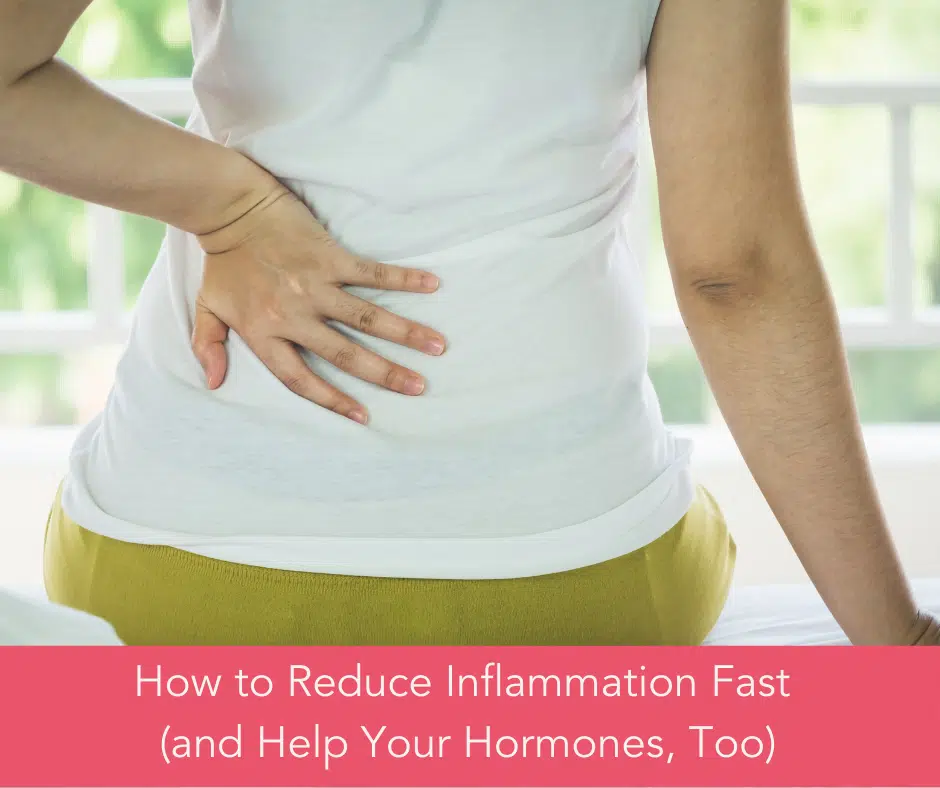
What You Will Learn From This Article:
- The difference between healing and chronic inflammation
- Symptoms of acute and chronic inflammation: includes belly fat, chronic pain, autoimmunity, allergies, and more
- What causes inflammation: includes stress, dairy, coffee, alcohol and more
- Ways to reduce inflammation: includes resistant starch, green leafy veggies, certain herbs and spices, and reducing your stress, and more
- 4 ways chronic inflammation affects your hormones
- Our top supplement recommendation for reducing inflammation
What is Inflammation?
Inflammation is your immune system’s response to stress or injury in or to the body. Those traumas may come in different forms, physical (bone fracture, cut or scrape, burn, rash), dietary (processed food, fried food, sugar, allergenic foods), and environmental (mold, metal toxicity, chemical-laden cleaning, and personal care products, etc).
Inflammation is the first step in the healing process. When cells are damaged, they send out chemical messengers that cause swelling, which isolates the offending substance and keeps it from penetrating more cells. The chemical messengers also call white blood cells to the site of injury to get rid of bacteria and dead or damaged cells. The resulting product is pus.
Inflammation as part of healing is a good thing. It’s when it develops into chronic inflammation that there’s a problem.
Signs of Inflammation
The “textbook” signs of inflammation are redness, heat, swelling, pain, and loss of function that occur at the site of the injury. Some common examples where you can actually see and experience the five cardinal signs might be sunburn, stepping on a nail, or bumping your head and getting a “goose egg.”
Chronic inflammation isn’t always as noticeable as the acute inflammation mentioned above. Chronic pain may get your attention — which is the whole idea behind inflammation (so you protect the injured area) – but inflamed blood vessels might not.
Chronic inflammation may silently persist while it causes downstream effects, and may show up in the body as one or more of the following:
- Belly Fat
- Weight gain
- Chronic pain
- Accelerated aging
- Hormonal problems, especially insulin resistance
- Autoimmunity, including Hashimoto’s
- Allergies
- Chronic pain conditions
- Digestive problems: IBS, Inflammatory Bowel Disease, etc
- Cardiovascular disease
- Neurodegenerative diseases
- Blood test: CRP-hs (C-Reactive Protein highly sensitive) higher than 3.00 mg/L (although ideally, it should be no more than 1 mg/L)
- Elevated blood sugar levels (HA1C, fasting glucose or insulin)
- Many more
Functional medicine practitioners today are of the opinion that inflammation is the root cause of most chronic disease.
What Causes Inflammation?
There are a number of dietary and lifestyle choices that can cause inflammation. One of the primary ways we create inflammation through our lifestyle is stress.
Stress raises key inflammatory messengers in our bodies, called inflammatory cytokines. There is a direct correlation between the perceived stress in our lives and the levels of these inflammatory molecules. Interleukin-6 and TNF-alpha are a couple of those inflammatory markers. Interleukin-6 particularly raises your levels of C-reactive protein, a marker commonly tested to check your inflammation level.
Inflammation partly explains why women who are perpetually stressed are having a really hard time losing weight.
Diet is another main contributor. Foods can either cause inflammation or help reduce inflammation – and some foods cause inflammation in some people, but not others.
Foods that generally cause inflammation include:
- Sugar – including fructose (study)
- Artificial sweeteners
- Processed foods of all kinds
- Fried foods
- Wheat + gluten
- Dairy
- Too much meat, especially raised in cages
- Refined, high omega 6 oils
- Trans fats
- Excessive alcohol
- Coffee
- Foods specific to you (food allergies, histamine intolerance, lectin sensitivity, thiol sensitivity, salicylate intolerance, oxalate intolerance… etc.)
Nutrient deficiencies or imbalances, such as an altered omega-6 to omega-3 ratio, and inadequate intake of vitamins and minerals may also tip the scale toward an inflammatory state.
When otherwise healthy foods become inflammatory, it’s because your immune system has become overactive and imbalanced. To rebalance the immune system, it’s important to address the microbiome. Resistant starch can help restore your microbiome, balance your hormones, and lower your inflammation.
Lack of sleep has been shown in research to raise levels of inflammatory markers in the body. Check out my interview with the sleep doctor, Michael Breus, Ph.D., to learn more about the connection between sleep and inflammation.
Toxicity from environmental and lifestyle factors can also raise your body’s inflammation. The body sees these foreign substances as poisons and sets off an immune response, raising inflammation. You can read more about sources of toxicity and how to lower your exposure here, here, and here.
Smoking counts as another source of toxicity and can also contribute to chronic inflammation.
Ways to Reduce Inflammation
First, lower your toxic load by eliminating those dangerous household, outdoor, and personal care products. Detox your home and find healthy replacements. Quit smoking. You might even consider doing a detox program on yourself.
However, one of the easiest, most straight-forward strategies you can follow is to get rid of inflammatory foods and add in more whole foods.
Some foods that are known to reduce inflammation include:
- Resistant Starch
- Green leafy vegetables (study)
- Olive oil and other healthy fats (be sure you pick the real thing – I cover the best olive oil you can get here)
- Fatty fish, like wild caught salmon (rich in omega 3s)
- Richly colored berries (study) and cherries (study)
- Green tea (I love Pique tea)
- Superfoods: Here’s a list of 5 (with recipes) that can help you lower inflammation and balance your hormones at the same time.
Reducing your stress levels will undoubtedly help in lowering your inflammation levels. Some good ways to reduce stress-induced inflammation include:
- Self-care
- Meditation (study)
- Yoga (study)
- Red and near-Infrared light
- Infrared saunas
- Keeping a gratitude journal (study)
Sleep – Getting a good night’s sleep is vital for lowering your stress and inflammation levels and getting you back on the path to healing. Here are 13 sleep strategies to get you started.
Certain herbs and spices can also help lower inflammation, such as rosemary, oregano, thyme, chamomile, ginger, nutmeg, cloves, black pepper, and turmeric. Try to incorporate fresh herbs and spices into your diet whenever you can. Not only will your food taste spectacular, but your body will thank you, too!
If you can find a way to add them to your diet, please do! Many of them are part of my cookbook Cooking for Hormone Balance.
Sometimes it can be difficult to get in all those spices on a regular basis. To create consistency, that’s where a supplement can help.
4 ways chronic inflammation affects your hormones
1. Increases cortisol levels
When the body experiences chronic inflammation, it produces an increased amount of stress hormones, like cortisol. This can lead to an imbalance in other hormones, such as progesterone, estrogen, and testosterone. This can make symptoms of estrogen dominance worse.
2. Shuts down hormone receptors
Chronic inflammation can cause a decrease in the number of cell receptors that respond to progesterone, estrogen, and testosterone. This means that even when the body produces hormones, the cells are not able to recognize and respond to the hormones, leading to a hormonal imbalance.
3. Creates receptor resistance
Chronic inflammation can cause the cells to become resistant to the hormones, meaning that even if the body produces an appropriate amount of hormones, the cells are not able to recognize and respond to them. Heard of insulin resistance? The resistance can happen to other hormones including estrogen, progesterone, and testosterone.
4. Increases aromatase activity
Chronic inflammation can cause more testosterone to be converted into estrogens (what’s called aromatisation) and contribute to more Estrogen Dominance.
Anti-inflammatory Supplement I Recommend
Wellena’s Curcumina is a full-spectrum turmeric that contains all curcuminoids (curcumin, demethoxycurcumin, bisdemethoxycurcumin) as well as the natively present essential oils.
The patented extraction technology is called BCM-95 and has clinically shown to be more efficacious as compared to other forms of turmeric, including formulas that include pepper. Double steam distillation is at the core of BCM-95 used for our turmeric, which extracts the essential oils and shows superior results compared to the curcumin + pepper combination.
It showed that the absorption of curcuminoids in BCM-95 was 5-7x higher than curcumin 95%. Curcumin was retained in the blood for only four-five hours; BCM-95 was retained in the blood for more than 8 hours, making it a more active product.
How Curcumina can help your hormones:
- Benefits the entire endocrine system; production and metabolism of the hormones
- Upregulates cells for better uptake of hormones
- Can reduce hot flashes
- May reduce symptoms of Estrogen Dominance
- Can help optimize conversion of T4 to T3 thyroid hormones
- Aids liver detoxification (so crucial in
How Curcumina can support your overall health:
- Provides antioxidant and cell-protective activity
- Supports joint health and helps relieve minor pain
- Supports the immune system by modulating the production of cytokines
- Supports brain/neuronal health and a healthy mood
- Supports a healthy microbial environment
How to Take: Take 1 capsule per day or as directed by your health care practitioner.
Helpful Tip
To learn more about how to use supplements to balance your hormones, get our free Supplement Guide here.
Learn more with Overcoming Estrogen Dominance
“The body has an amazing ability to heal. We just need to give it the right resources.”
In Overcoming Estrogen Dominance, my goal is to empower and give you the tools to take control of your hormones and health.
More than 70% of women experience estrogen dominance. The symptoms range from lumpy and fibrocystic breasts to thyroid nodules, hot flashes, fibroids, uterine polyps, painful, heavy or irregular periods to infertility and miscarriages, from mood swings to insomnia, weight gain to fatigue.
So many women have experienced the pain and frustration that comes when they feel their symptoms and complaints are dismissed or minimized. This is particularly true for women who are experiencing the symptoms of hormone imbalance. Even when doctors do offer treatment, it’s typically in the form of prescription medication or invasive surgical procedures.
In Overcoming Estrogen Dominance, I hope to show that those extreme interventions are often unnecessary, and to give women a roadmap to reverse estrogen dominance using food, herbs, supplements and natural protocols to rebalance hormones.
To get your copy of Overcoming Estrogen Dominance, go here.
Resources
- https://www.ncbi.nlm.nih.gov/pmc/articles/PMC3548567
- https://medlineplus.gov/ency/article/000821.htm
- https://www.ncbi.nlm.nih.gov/pmc/articles/PMC5476783
- https://www.frontiersin.org/articles/10.3389/fimmu.2018.00754/full
- https://www.ncbi.nlm.nih.gov/pubmed/21807932
- https://www.ncbi.nlm.nih.gov/pmc/articles/PMC3350341/
- https://academic.oup.com/ajcn/article/81/2/341/4607411
- https://www.ncbi.nlm.nih.gov/pmc/articles/PMC3601579/
- https://www.ncbi.nlm.nih.gov/pmc/articles/PMC5872786/
- https://www.ncbi.nlm.nih.gov/pmc/articles/PMC3261116/
- https://www.ncbi.nlm.nih.gov/pmc/articles/PMC4851883/
- https://www.choprafoundation.org/education-research/past-studies/gratitude-study/
- https://www.ncbi.nlm.nih.gov/pmc/articles/PMC3011108/
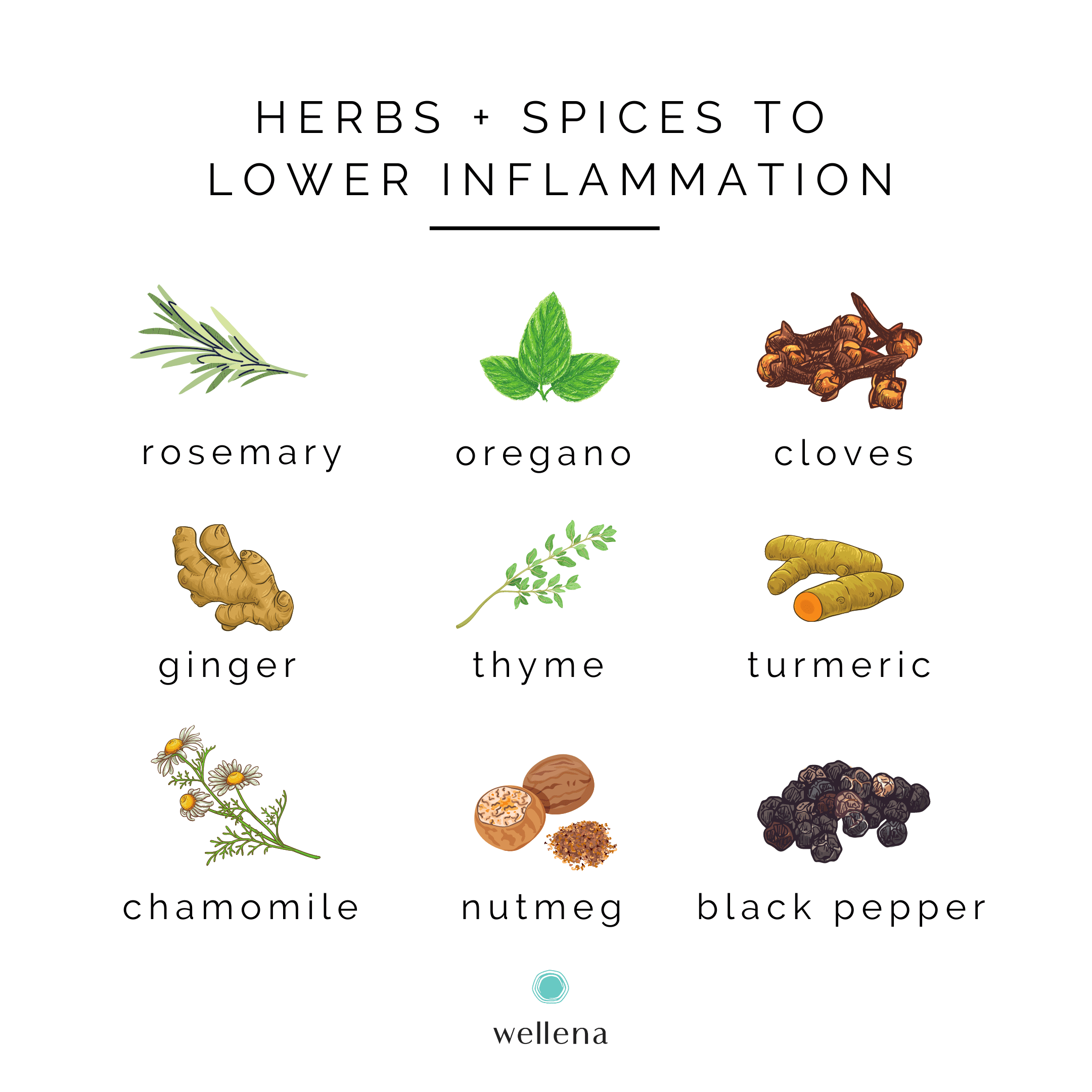
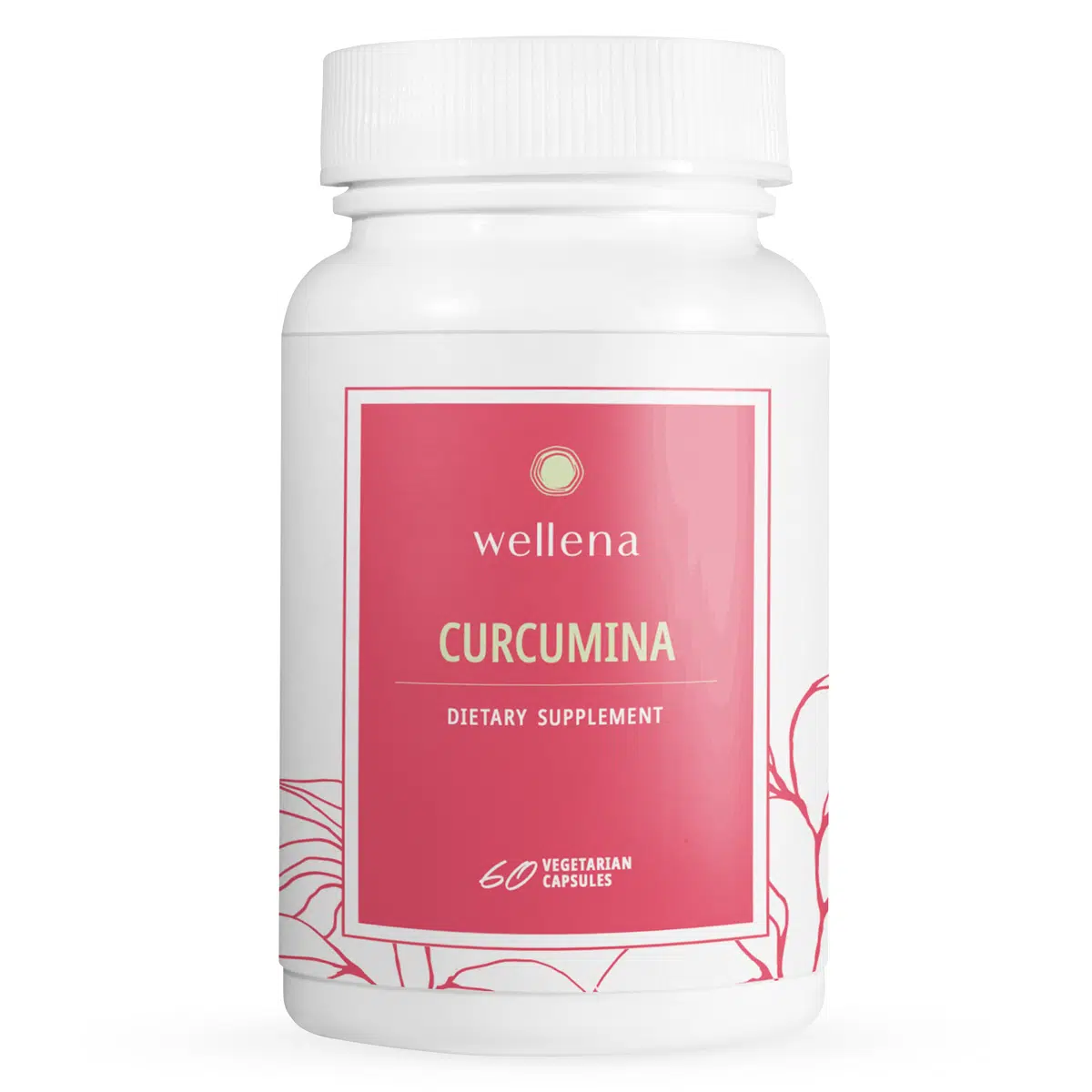
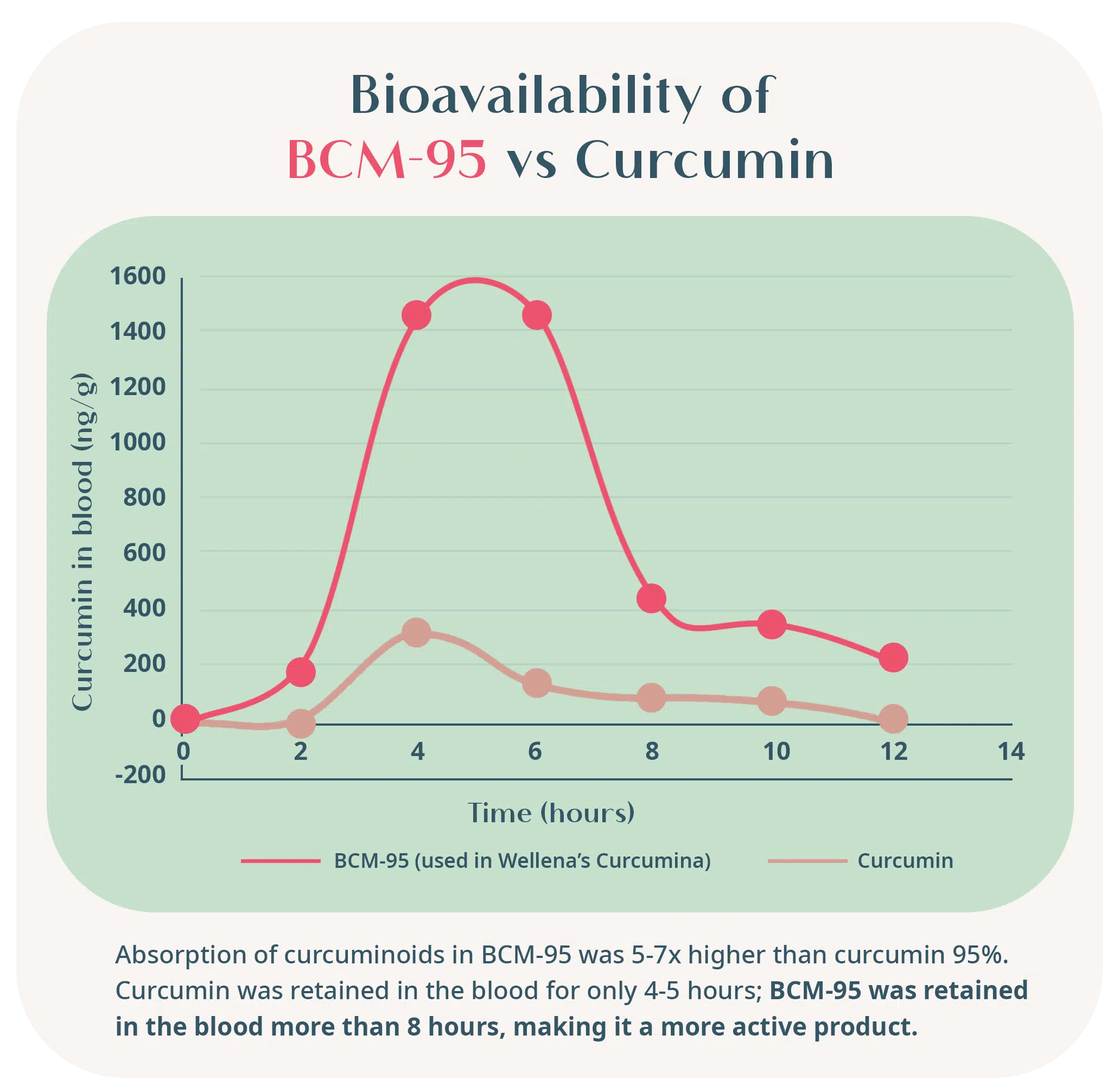
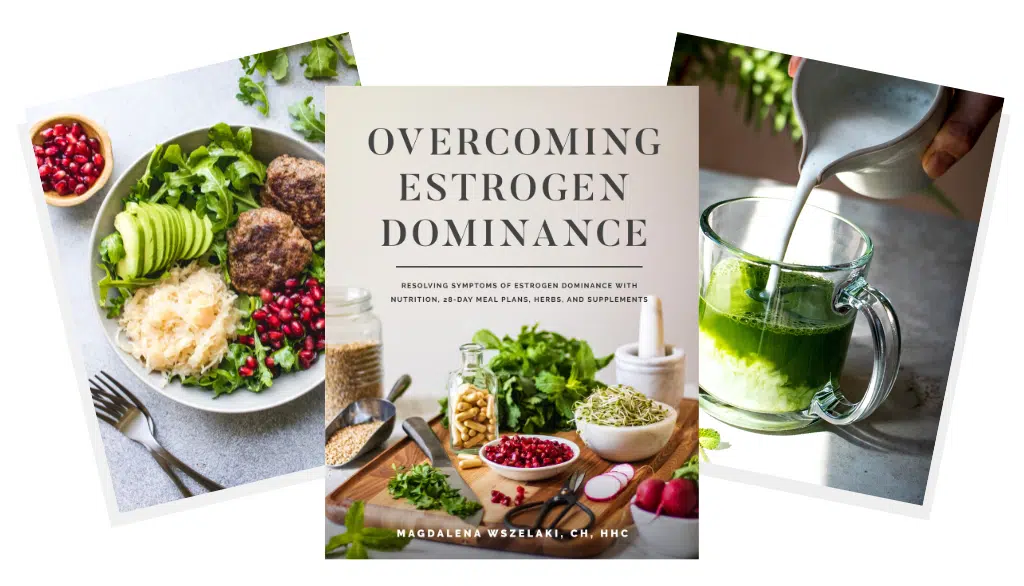
This showed up just in time. I was going to ask my doctor if my exhaustion is caused by my thyroid since she insists it is not from the methotrexate she has had me on (which I just took myself off). thank you
That’s wonderful! Thank you for sharing:) ~ Jeanne HB Team
can you write an article on pernicious anemia and how to treat?
Hi Robin, Thank you for your suggestion! I have submitted your request for Magdalena to consider writing an article on pernicious anemia and how to treat it. ~ Jeanne HB Team
Magdalena,
I have been following your advice for some time and
do appreciate how you decipher inflammatory response in a relatable way that is understandable and practical in this article 👍
Thank you 😊 for being you and all that you do ❤️
Many Blessings ~
Hi Prosperity, Thank you for your kind words! We are so glad to hear you found this article helpful:) ~ Jeanne HB Team
Thank you for this article. It’s very helpful!
Thank you for reaching out! We are glad to hear you found this article helpful:) ~ Jeanne HB Team
Thank you for the article.
I’m wondering, can this supplement be used by men just as effectively?
Thank you!
Hi Angela,
Thank you for reaching out! Yes, the formula can be used by both men and women – these enzymes help break down damaged tissue, and thus, work to promote a healthy response to inflammation in the body.
I hope this helps!
Jeanne HB Team
I seem to be getting a lot of skin tags on my body, they are very small, about the size of pinheads. Can you tell me if this is a sort of inflammation showing up as skin tags and if so what is the cause of it?
I’m no expert Ella but I read they usually appear in places of friction, like armpits and inner thighs where skin may rub if that’s helpful 🤔 or not 🙃
Cheers ~
HI Ela, I hope you found my email response helpful, today. Please let us know if you have further questions. ~ Jeanne HB Team
I heard a expert say skin tags could also be due to low zinc levels.
I took 1 Inflammavail right before eating. I had severe pain in my upper chest. [I don’t have heart issues.] I do have a level 3 hiatal hernia. Would that contraindicate this supplement?
Hi Mary,
That sounds upsetting. We cannot determine if your severe pain in your upper chest was caused by the inflammavail. We have not heard of the occurring with this or any supplement. However, we always want you to feel safe and satisfied with your product. Please send an email to [email protected] to discuss this occurrence with the team. Thank you ~HB Team
add acupuncture to this list !! 🙂
Hi Shant,
Thank you for your input ~HB Team
i have sjogren’s syndrome which is an autoimmune condition that can cause inflammation to the body at anytime. so the recommendations are helpful for me as it will reduce the problems. also been advised by a dietician to try a paleo diet which excludes grains, beans and process foods.
[…] 3 has been shown to lower inflammation in the body. Chronic inflammation is caused by an unhealthy diet, pollution, stress, and taking in too much omega […]
[…] low grade systemic inflammation has been tied to hot flashes. What can cause chronic systemic inflammation? Certainly dietary choices – an inflammatory diet or eating foods that cause inflammation in […]
Had a hysterectomy and it sent my body in a free fall. I have issues with hot flashes and most nights I can’t rest. I do believe that my blood sugar levels are now elevated. I have tried to get my doctor that my thyroid may be low function too. She said the test come back OK. I am really tired of feeling like this. I know there is a better way to get my health back. I take supplements like B, calcium, magnesium and they don’t seem to help that much. What do you recommend.
Hi Lynette,
Please feel free to reach out to [email protected] and we would be happy to assist you.
Healthy Regards,
HB Team
[…] and other factors (like stress or inadequate sleep) can impact your hormone levels, which can also cause skin […]
[…] Learn more about how inflammation impacts your hormones by reading this article: How to Reduce Inflammation Fast (and Help Your Hormones, Too. […]
[…] Inflammation also impacts your hormones. Learn more by reading this article: How to Reduce Inflammation Fast (and Help Your Hormones, Too). […]
[…] https://hormonesbalance.com/articles/how-to-reduce-inflammation-fast/ […]
Anti Inflammation supplements are better at this stage, and most accessories don’t have any side effects. Do you think night fat-burning supplements can be good in this stage?
Hi Madeline, we don’t recommend fat-burning supplements as those supplements are usually of poor quality and can be harmful blends of herbs. Although, there can be some great herbs mixed in, looking for herbs specifically studied for their support in the inflammatory processes would be a better option. ~HB Team
Hello I’m curious what are the resistant starch to reduce inflammation
Hi Sarah, green plantain flour, rice salads, and cold potato salads are all great options to introduce resistant starch into your diet. This article contains some additional information you may be interested in.
https://hormonesbalance.com/articles/resistant-starch-a-prebiotic-that-helps-our-hormonal-balance/
I hope this helps, ~HB Support
I currently suffer from GERD. I am on protazole I believe it’s called. Doesn’t work anymore, just compounds problem. Trying to quite smoking. I had coughing fit in morning so bad, my chest is all inflamed. I wake up with tightness in chest everyday and feel like I can’t breath. Do need to move because the mold in this place is bad and landlord doesn’t care. What can I take. Rarely sleep properly anymore. Trying to seen off hrp since I am 50 but makes me feel yuckie. Everyone I want to see a doc it is such a procedure. Tell me it’s covid all the time! Yet, this has been going on for years. My physical three months ago was perfect,all blood work perfect. Do have IBS like issues where I get so constipated, take laxatives and fast to pass stool. They say IBS , I day mass of scare tissue from hysterectomy I never consented to. What can I do?
Hi Lisa, it sounds like you have a lot of things going on at once and many of which may be related to inflammation and of course smoking is a big contributor to many health issues. Quitting smoking and starting to deal with your internal inflammation and toxins would be a great first step. Working with a functional medicine practitioner may also be a really good option to help give you specific recommendations to help you in your current health situation. ~HB Support
Hello HB-team,
is there anything you can suggest to get rid of my very bad chronic periodontitis. It knocks me off my feet and always in waves, means sometimes there are weeks where I have nothing and then I have it very bad again.
My dentist says that’s no lack of mouth hygiene. He has never seen such a well groomed mouth.
For suggestions I would be very grateful.
Amy
I need help with mine
Can this be taken while taking HRT
Hi Dorrir,
It’s always a great idea to check in with your practitioner when you add something new. Additionally, we are not aware of any contraindications with HRT or BHRT. HB Support
Many thanks Magdalena! As always clear and thorough. But my question is regarding curcumin supplements. Since my early childhood following hepatic inflammation my liver is very sensitive. I tried taking curcumin supplements but I felt reaction in the liver. I now just add a quarter tsp to hummus, or other cooked food being careful not to overdo. Is there a safe way for me to take this supplement??
Appreciate your answer!
Hi Vera, You are welcome. We are not medial professionals, so would suggest speaking with your practitioner to find what would be best for you. Take care, Jennifer